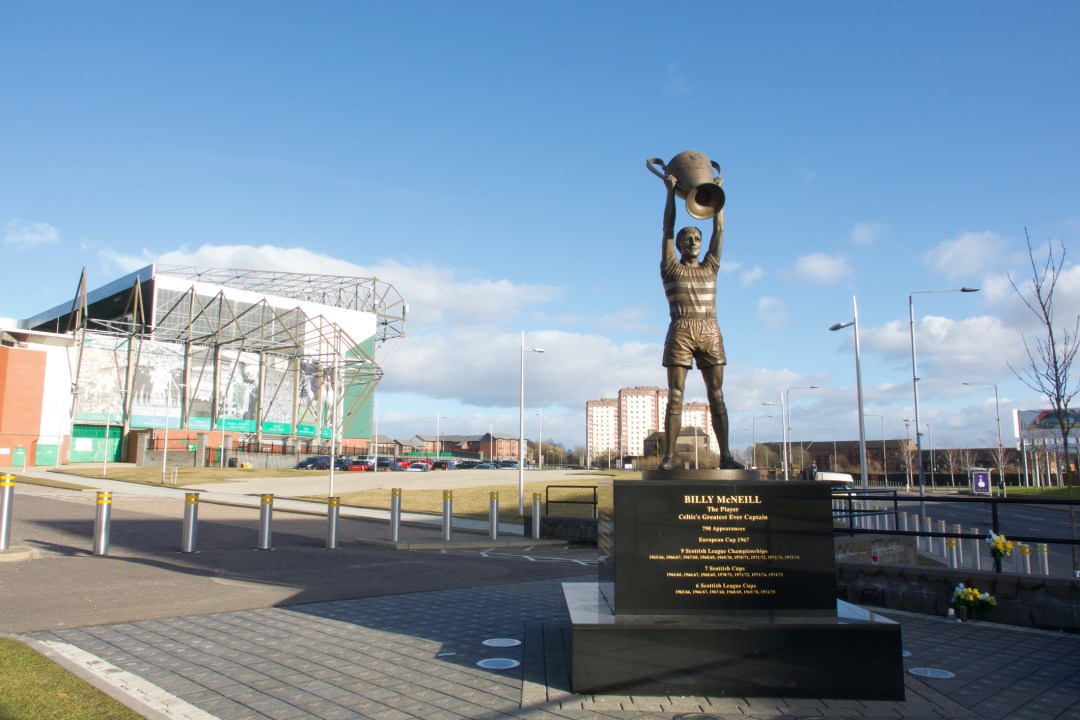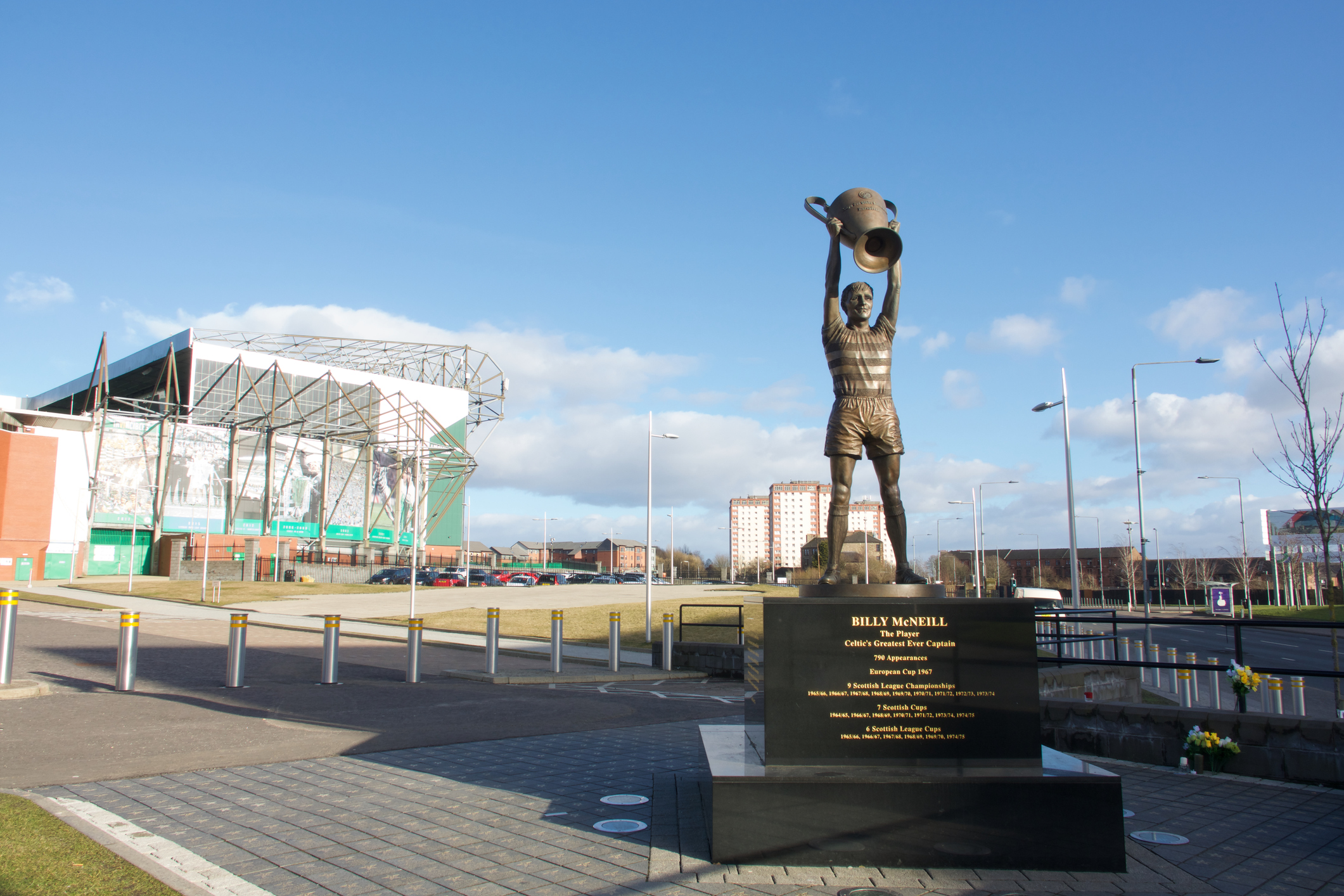Certain deaths unavoidably feel like the closing of an era, the final confirmation that what has been and gone can never return. One such is the passing of Billy McNeill, whose death, at the age of 79, was announced this morning. The Celtic captain, skipper of not just that club’s greatest side but of the finest team that ever emerged from Scotland; the only Scottish team to win the european cup and the first British side to do so, was one of a kind.
All football clubs cherish their heritage but few more devoutly than Celtic. If the club’s penchant for underdog status sits oddly with its remarkable record of achievement – Celtic will soon win the Scottish championship for a fiftieth time – it still reflects something real. This has not just been a football club, it has been a family. A movement for Catholic Scots and Scots of Irish descent that for generations has understood itself as the outsiders, forever considered somehow suspect or not quite the thing by a Scottish establishment whose colours, especially in Glasgow, were the royal blue of Rangers, not the green and white of Celtic. There was enough truth in this for it to matter, even if – especially when viewed from outwith the Old Firm duopoly – the distinction has always seemed one of degree not kind.
But of McNeill it may reasonably be said we shall not see his like again. As the obituaries remind us, he was nicknamed Cesar after the actor Cesar Romero on the account of his looks but the public preferred to think of him as “Caesar”, a sobriquet better fitting his imperial demeanour at the heart of an all-conquering Celtic XI that won nine consecutive Scottish league titles. Indeed, in the course of a career amounting to 800 or so games in the hoops, McNeill gathered a personal haul of 31 trophies.
Football has changed since those black-and-white days and often for the better. But even progress and improvement come at a cost. The commercialisation of the sport, both made possible by and dependent on the globalised commodification of entertainment, has made elite football a wholly different game to that played by McNeill.
This season’s Champions League has proven unusually interesting. The progress of Tottenham Hotspur and Ajax to the semi-finals has offered a refreshing alternative to the cast of suspects commonly present at the sharp end of european football’s flagship competition.
Satisfying as this has been, some perspective is required. According to Forbes magazine’s latest analysis, Tottenham is the tenth most valuable club on the planet. As also-rans go, they run pretty far and pretty fast. Ajax, meanwhile, provide a more interesting case. That a club which has won the tournament four times can be considered plucky, impoverished underdogs tells you everything it is necessary to know about how european football has, at the highest level, become a closed shop entrance to which is denied to all but a gilded few. And, in this context, Ajax really are plucky, impoverished underdogs. So much so in fact that anyone possessing even an ounce or two of romance must keenly hope they lift the trophy for a fifth time. It would be a more remarkable achievement than any previously enjoyed by one of europe’s greatest clubs.
As everyone knows – and, yes, as some are tired of hearing – every member of the side McNeil led to glory in Lisbon was born and brought up within 30 miles of Celtic Park. That was remarkable even fifty years ago; it would be simply impossible now and not just because the seams of talent to be mined in Glasgow and Lanarkshire were deeper then.
That gave McNeill’s side a rare distinction that has proved imperishable, adding lustre to a legend that would have more than sufficed even without that quality. These were the Glasgow boys that took on, and beat, a continent. On that hot Lisbon afternoon in the summer of 1967 Internazionale of Milan were confident they’d win the european cup for a third time. They reckoned without Jock Stein’s men; they reckoned without the Lions of Lisbon.
And it was not just Celtic’s status as underdogs that won so many admirers then; it was also their commitment to attacking football. There is a peculiar beauty to the catenaccio style preferred, indeed mastered, by Helenio Herrera’s Inter team but it is one for a particular type of purist. To put it differently, if everyone played like that football would be a diminished spectacle. Celtic, by contrast and in keeping with the club’s idea of its own traditions, were an attacking phenomenon. They ran Inter off their feet and Stevie Chalmers’ winner, struck with just five minutes left on the clock, was both a long time coming and seemingly inevitable. It was also a blow for a particular idea of what football should be.
As Bill Shankly, whose Liverpool side had been demolished by Ajax earlier in the competition, told Stein, “John, you’re immortal now”. All true and a status by no means confined to the manager. McNeill, who captained the club for a dozen seasons, was rendered immortal that day too. Scottish football has not seen the like of that team, which reached another final and a brace of semi-finals too, again. Nor, indeed, has British football while on the continent perhaps the homegrown Ajax side which triumphed in 1995 comes closest to equalling Celtic’s achievement.
That Ajax side disappeared overnight, however, plucked clean by richer clubs in Italy, Spain, and England. This year’s underdogs from Amsterdam will suffer the same fate; enjoy their presence together while you can for it will not, cannot, last for long.
In 1967 Celtic defeated the champions of Switzerland, France, Yugoslavia, Czechoslovakia, and Italy. On a given day, the randomness essential to knock-out competition could have sunk the Scots’ chances. That randomness – upon which sport depends more than the people who run sport allow – would in time prove too much for european football’s guardians. The Champions League is not just about making money – though of course it is largely about that – it is about making sure that money is shared between a select, unchanging, few. Randomness is the enemy because business plans demand predictable income streams.
So, even as we marvel as Lionel Messi or Cristiano Ronaldo or whomever else, we know, deep down, modern football has privileged spectacle at the expense of poetry. There can be no room for the unknown, the new, the surprising. It makes for a great show but one whose rewards are subject to the law of diminishing returns. It is magnificent in its way, but it is not sport. It is a commodity that knows the price of everything but the value of rather less.
The idea a team from Scotland could become champions of europe now is palpably absurd. But then the notion clubs such as Red Star Belgrade or Steaua Bucharest could do so once again is equally absurd. This century, only Porto have challenged the plutocratic elite and that too was a one-off whose reoccurrence seems less probable year by year. The money doesn’t allow for it.
Sport requires competition, otherwise it is only spectacle. The field has never been truly level but it was once level enough for surprise and wonder. Removing that, stripping sport of its randomness, impoverishes it even as it enriches those protected from upsets.
In that sense, the death of Billy McNeill is the end of one world. McNeill was the leonine symbol of that great Celtic era; the Caesar of a team that conquered all worlds available to it. Something precious has been lost since then and not just in Scotland either.








Comments